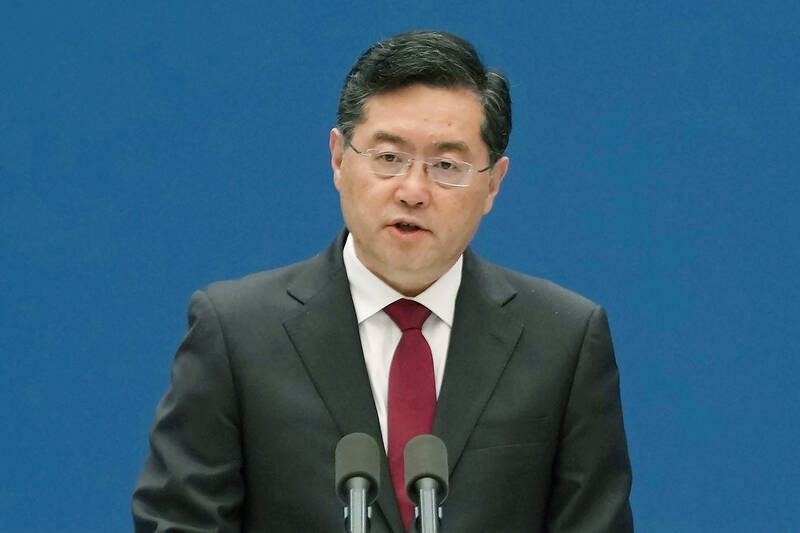Chinese Minister of Foreign Affairs Qin Gang (秦剛) yesterday told the US ambassador to China that Washington is responsible for the downturn in relations between the two nations and must “reflect deeply” before ties can return to a healthy track, an official said.
Qin Gang’s comments follow a suspension of serious dialogue on a range of issues between the world’s largest economies, increasingly at odds over tariffs, attempts by Washington to deprive China of cutting-edge technology, and China’s claims to Taiwan and large parts of the South and East China seas.
The Chinese Ministry of Foreign Affairs quoted Qin as telling US Ambassador to China Nicolas Burns that a “series of erroneous words and deeds by the US” since a meeting in November last year between US President Joe Biden and Chinese President Xi Jinping (習近平) “have undermined the hard-won positive momentum of Sino-US relations.”

Photo: AP
“The US side should reflect deeply, meet China halfway, and propel China-US relations out of the difficulties and back on the right track,” Qin was quoted as saying.
The US should “correct its understanding of China and return to rationality,” Qin said, repeating his earlier accusation that the US is attempting to suppress and contain China.
Beijing routinely cites US political and military support of Taiwan as infringing on its sovereignty.
Qin said ties had “grown icy,” and the priority was to stabilize them “and avoid a downward spiral and unanticipated events.”
The US should stop “undermining China’s sovereignty, security and development interests,” particularly through support of Taiwan, Qin said.
US law requires it to treat threats to Taiwan, including a military blockade, as a matter of “grave concern,” though it remains ambiguous under what conditions US forces could be dispatched to defend the nation.
Despite the lack of formal diplomatic relations, the US is Taiwan’s largest supplier of military hardware and diplomatic support, even while it maintains relations with Beijing.
At a daily briefing yesterday, Chinese Ministry of Foreign Affairs spokesperson Wang Wenbin (汪文斌) described the meeting between Qin and Burns as ”a normal diplomatic arrangement.”
Burns wrote on Twitter that he met with Qin and discussed challenges in the US-China relationship “and the necessity of stabilizing ties and expanding high-level communication.”
In comments to a US think tank last week, Burns said Washington has been consistent in its approach toward Taiwan, and insists that “any resolution of the [cross-Taiwan Strait] differences has to be peaceful.”
“We hope that the government here in China will commit itself to a peaceful resolution of the dispute,” Burns said in an online discussion with the Washington-based Stimson Center.

INVESTIGATION: The case is the latest instance of a DPP figure being implicated in an espionage network accused of allegedly leaking information to Chinese intelligence Democratic Progressive Party (DPP) member Ho Jen-chieh (何仁傑) was detained and held incommunicado yesterday on suspicion of spying for China during his tenure as assistant to then-minister of foreign affairs Joseph Wu (吳釗燮). The Taipei District Prosecutors’ Office said Ho was implicated during its investigation into alleged spying activities by former Presidential Office consultant Wu Shang-yu (吳尚雨). Prosecutors said there is reason to believe Ho breached the National Security Act (國家安全法) by leaking classified Ministry of Foreign Affairs information to Chinese intelligence. Following interrogation, prosecutors petitioned the Taipei District Court to detain Ho, citing concerns over potential collusion or tampering of evidence. The

Seventy percent of middle and elementary schools now conduct English classes entirely in English, the Ministry of Education said, as it encourages schools nationwide to adopt this practice Minister of Education (MOE) Cheng Ying-yao (鄭英耀) is scheduled to present a report on the government’s bilingual education policy to the Legislative Yuan’s Education and Culture Committee today. The report would outline strategies aimed at expanding access to education, reducing regional disparities and improving talent cultivation. Implementation of bilingual education policies has varied across local governments, occasionally drawing public criticism. For example, some schools have required teachers of non-English subjects to pass English proficiency

NEGOTIATIONS: The US response to the countermeasures and plans Taiwan presented has been positive, including boosting procurement and investment, the president said Taiwan is included in the first group for trade negotiations with the US, President William Lai (賴清德) said yesterday, as he seeks to shield Taiwanese exporters from a 32 percent tariff. In Washington, US Trade Representative Jamieson Greer said in an interview on Fox News on Thursday that he would speak to his Taiwanese and Israeli counterparts yesterday about tariffs after holding a long discussion with the Vietnamese earlier. US President Donald Trump on Wednesday postponed punishing levies on multiple trade partners, including Taiwan, for three months after trillions of US dollars were wiped off global markets. He has maintained a 10 percent

TRADE: The premier pledged safeguards on ‘Made in Taiwan’ labeling, anti-dumping measures and stricter export controls to strengthen its position in trade talks Products labeled “made in Taiwan” must be genuinely made in Taiwan, Premier Cho Jung-tai (卓榮泰) said yesterday, vowing to enforce strict safeguards against “origin laundering” and initiate anti-dumping investigations to prevent China dumping its products in Taiwan. Cho made the remarks in a discussion session with representatives from industries in Kaohsiung. In response to the US government’s recent announcement of “reciprocal” tariffs on its trading partners, President William Lai (賴清德) and Cho last week began a series of consultations with industry leaders nationwide to gather feedback and address concerns. Taiwanese and US officials held a videoconference on Friday evening to discuss the